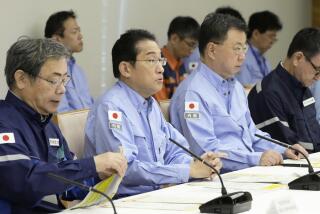Japan’s Military Steps Up
- Share via
Japan’s suffering in the atomic bombings of Hiroshima and Nagasaki that ended World War II and the U.S.-written “peace constitution” later imposed on the shattered country gave Tokyo a long allergy to combat. For decades, the constitution, with its renunciation of war, was a reason and excuse to limit Japan’s role in rebuilding war-ravaged nations to that of financier. But, in Iraq, that role is about to change dramatically.
Japan has sent 100 troops to the southern Iraqi town of Samawah and plans to dispatch several hundred more. The numbers are not large, but they demonstrate a welcome expansion of Tokyo’s presence in world affairs, befitting the world’s No. 2 economy.
Japanese forces that helped keep the peace in Cambodia and East Timor arrived after hostilities ended. The deployment in Iraq is the first foray into an active combat zone in nearly 60 years. The Japanese government has been careful to bill the army deployment as a humanitarian mission in which engineers are restoring water supplies and fixing schools and roads, but it’s still in a live combat area. Critics have charged that the expedition violates the constitution, especially Article 9, which bars “the threat or use of force as a means of settling international disputes.”
The underlying question is whether the political climate supports a change. A poll in the Nihon Keizai newspaper Monday said support for Prime Minister Junichiro Koizumi had risen this year. That suggests public acceptance of his efforts to send troops to help rebuild Iraq. Recent polls for the Mainichi newspaper and Kyodo news service also found increased support for dispatching army forces. But given the postwar tradition of pacifism, support could quickly turn to opposition if Japanese troops are killed or wounded.
To its credit, in preparing the Japanese public for the change in policy, the government warned that troops would not be withdrawn even if they sustained casualties.
Japan has also pledged $1.5 billion this year for Iraqi reconstruction, a form of “checkbook diplomacy” that has long been a staple. Japan paid much of the cost of the 1991 Persian Gulf War, but its refusal to send troops prompted international criticism.
North Korea’s test-firing of a missile over Japan in 1998 and its suspected nuclear weapons development program have alarmed the Japanese and fueled talk of a more active role for the armed forces. Japan’s success at building a democracy with civilian control of the military should encourage it to contribute peacekeeping troops alongside the world’s other developed nations.
More to Read
Sign up for Essential California
The most important California stories and recommendations in your inbox every morning.
You may occasionally receive promotional content from the Los Angeles Times.












